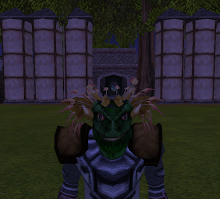1) Recall points: In Istaria (as in many MMOs), your character can 'bind' themselves to a spot and return their any time at the press of a button. However, you can only be bound to one place at a time. With a beautiful plot on the edge of the village of Darvus, it's not practical to make it my recall point because it's in the middle of nowhere, and I have to run a mile to the nearest portal (think Stargate-style teleporters that take you to other points in the world). It would be great if we could have a home recall as well as one other - perhaps we could do a cool quest to get the privilege once we get a class to level 100, for example, as a reward for our dedication to the cause :)
1b) OK, I know giving myself a cheaty extra wish already is a bit much, but its a kind of cover for the fact 1 is a little unlikely (and probably hard to implement). If not a second recall point, please, devs, could you at least put an 'out' portal in Darvus? Our neighbours have them and we're sick of being poor relations, especially on Order where Darvus is way more developed than the likes of Elmnic nearby.
2) Resources: While we're on the subject of Darvus, it would be nice if a few more nodes could appear nearby. One of the main things that makes Istaria great is the crafting, and making buildings that help people work on various crafting skills. My plot now has everything a young woodsman or weaver needs to ply their trade on the local elm and kenaf. However, the unpopulated local village of Elmnic (which also has an out portal, I may add!) gets nearly all the elm trees. Share the love around, please.
3) NPCs: NPCs, or non player characters, play an essential part in any MMO - they give out quests, buy and sell items, act as guards and gate keepers etc. Sadly, a couple of NPCs are missing in the region of Spire's Shadow, a key area to work on maple trees. While its certainly not a game breaker (top tip - jumping off Spire's Apex gets you pretty close - just be careful of the lake!) it surely wouldn't take much time to get these lazy buggers back to their posts so that we can attune to these landing pads. And bring back Seldon, even if its only for a week. I've still got a note to give back to him from about five years ago!
4) Structures: There have been persistent rumours of new buildings for players to build - non-human versions of many of the common structures such as houses, workshops and silos would be a great start. This would add so much to the landscape and give a much needed boost to players who have been around a long time. Istaria is very much built on players building on their plots and this area could do with a bit of love. Which leads me to the most important request...
5) Community projects: Please keep these coming! If I had to define one thing that made Istaria great, this would be it. There should always be community projects to work on - I've not been involved in the last few, as I've been working hard on my own plot, but some of the best times I've had in game have been on them. They bring people together, introduce new content and get people talking - all the good stuff. And if you can throw in random spawns of Withered Aegis (Istaria's bad guys) so the adventurers can get stuck in too, more's the better.
Learn more about Istaria at the official website, Istaria.com
